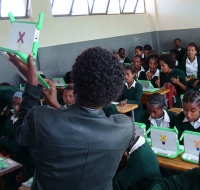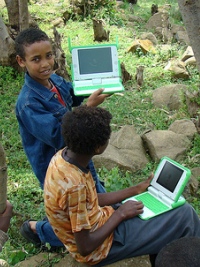The OLPC community recently found out about the publication of Ethiopia Implementation Report, September - December 2007, by Bjorn Everts, Matthew Herren, and David Hollow, of Eduvision. The report describes Ethiopian educational practice thus:
Within [the Ethiopian education] system, politeness and obedience are the main qualities that a teacher wishes to instill in their students. Exceptionally high importance is placed on the established hierarchy of authority from the teacher and the subordination of the student.
The notion of a student discovering information or teaching themselves is perceived to be connected with the idea of teachers failing to do their job properly. Subsequently, there is a reluctance for students to say or do anything more than what is asked of them, not necessarily due to ignorance or lack of interest but out of politeness and respect towards the teacher.
Negash, T (2006). Education in Ethiopia: From crisis to the brink of collapse. Discussion Paper 33, Nordiska Afrikainstitutet, Uppsala.
There are a few paragraphs of advertising in the report, claiming that Eduvision's software is better suited than the Sugar Activities for Ethiopian teaching methods. The reported test results mostly concerned Eduvision's Melopo activities, rather than Sugar Activities. Since Melopo is also somewhat collaborative, the results should transfer.
The most important observation is that teaching with the laptops, even under the constraints of the prevailing system, changed teacher behavior toward more effective methods. Instead of reciting instructions without a chance to try them out, students began to be encouraged to work on the computers, following instructions as they are given.
Teachers began to use structured group activities and competitions, and to ask students to present material to the class. The structured techniques that the teachers put into their XO lesson plans then spilled over into their non-computer classes. Where before any question from a student was seen as an insult to the teacher, teachers began to offer individual instruction while other students were occupied on the computers. Students were encouraged to work in small groups, and began to help each other. After a time, teachers began to allow questions generally, and to set aside time for them.
Student motivation was observed to be higher because they could mark up their electronic texts with notes and highlighting. This is a critical software function. Document readers alone are not sufficient. Eduvision recommends adding hyperlinks and some software functions to electronic texts. (I recommend adding way more software functions.)
The trial was quite successful in spite of many obstacles, such as XO's getting stuck in customs and delays in localizing texts to Amharic, and the somewhat unrealistic setting, with lots of professional help for teachers every day, and classes half the usual size. Eduvision sees how several components of teacher training can be automated, and recommends providing sample lesson plans. A larger trial with 5000 XOs was planned for April 2008. (I don't know what is actually happening with that.)
We are not talking about a complete changeover to Constructionism on the part of teachers, but the basic premise of the program is verified: Opportunity to do things better because of appropriate technology and training leads naturally to doing things better, in spite of seemingly intractable cultural obstacles. We can get through to the teachers, to the great advantage of students. There is more to come, but let us be grateful that the XO is accepted as an agent of change in addition to its more obvious benefits to schools.




"Where before any question from a student was seen as an insult to the teacher, ..."
You can't make this stuff up!
For me this is "expect the unexpected", and still be taken by surprise.
Nice to see they can adapt quickly to new opportunities.
Winter
Winter, it may come as a surprise, but that's the way questions are perceived in many cultures - as either a failure of the teacher to get you to memorize the right answer or as a challenge to the teacher, suggesting that the teacher isn't able to teach you all the knowledge that you need.
Not long ago, even in the USA, children were to be seen, not heard.
@Wayan:
"Winter, it may come as a surprise, but that's the way questions are perceived in many cultures-"
Obviously.
But I need reminders that "lecturing" too used to be just that "reading aloud", and it often still is.
(Wikipedia: "action of reading, that which is read," from the Latin lectus, pp. of legere "to read." ).
Winter
It is standard procedure in Bolivia to have the teacher read from a book or notes, and the kids copy verbatim on their notebooks. By middle school the teacher's pet might have the role of reading. Of course all evaluation is done on those notes.
A most celebrated prank when I was in Teacher's College in Uruguay was that someone stole the Math Teacher's class notes at one time, without him noticing - many years later it was still fondly remembered how he decided to not give a class that day.